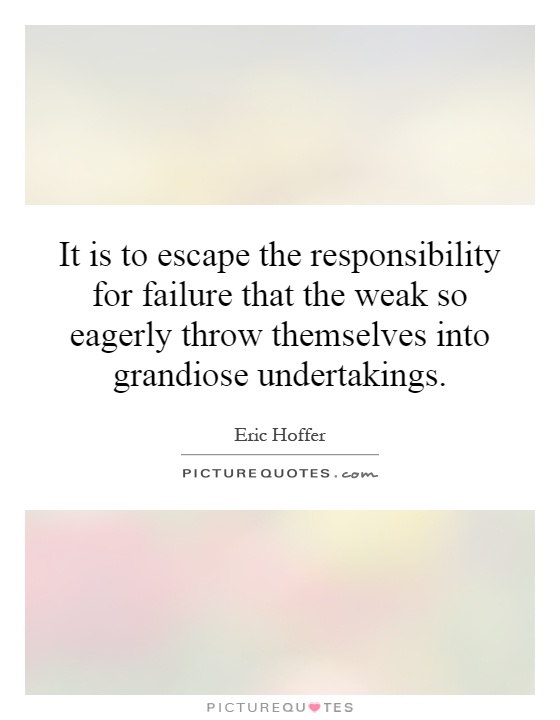It is to escape the responsibility for failure that the weak so eagerly throw themselves into grandiose undertakings

It is to escape the responsibility for failure that the weak so eagerly throw themselves into grandiose undertakings
Eric Hoffer, a renowned American philosopher and author, once said, "It is to escape the responsibility for failure that the weak so eagerly throw themselves into grandiose undertakings." This quote speaks volumes about human nature and the tendency for individuals to seek out ambitious projects as a way to avoid facing their own shortcomings.Hoffer's observation highlights a common phenomenon where people who feel inadequate or insecure about their abilities often gravitate towards grandiose undertakings in order to mask their fear of failure. By taking on monumental tasks or pursuing lofty goals, these individuals believe they can prove their worth and avoid confronting their own limitations. In essence, they use these grandiose undertakings as a shield to protect themselves from the harsh reality of their own inadequacies.
This behavior can be seen in various aspects of life, from personal relationships to professional endeavors. For example, someone who lacks self-confidence may throw themselves into a high-stakes project at work in the hopes of gaining recognition and validation from others. Similarly, a person struggling with feelings of inferiority may embark on a grand romantic gesture to prove their love and devotion to their partner.
However, while grandiose undertakings may provide a temporary sense of accomplishment and validation, they ultimately serve as a distraction from addressing the root cause of one's insecurities. Instead of facing their fears and working on self-improvement, the weak choose to hide behind the facade of grandiosity, perpetuating a cycle of avoidance and denial.












 Friendship Quotes
Friendship Quotes Love Quotes
Love Quotes Life Quotes
Life Quotes Funny Quotes
Funny Quotes Motivational Quotes
Motivational Quotes Inspirational Quotes
Inspirational Quotes